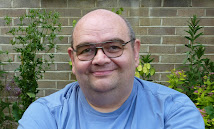Sitting alone in my little office with the door to the adjacent factory area open, as the people there worked cheerfully building their circuit boards, wiring harnesses and custom housings, I was preoccupied with the authoring of some graphics software. Subconsciously listening to the joking going on next door, and to the music of BBC Radio One coming from their tiny communal FM radio. The door to the reception area opened, and my boss appeared there. Glancing at my face, he told me to cheer up. Then he disappeared again, having assured me that "It might never happen."
But then it had just happened. Why did nobody seem aware of it yet? Everything appeared to be continuing as normal. Yet only a moment earlier, loud and clear the radio announcer's voice had punched through the humdrum chatter and pop, telling me that Space Shuttle Challenger had just exploded on launch. That was exactly twenty five years ago today, at this hour, as I'm sitting and writing these words now. My brain took a snapshot of that moment, one that I can still examine today, as if it were a physical photograph.
Looking Back
Like many people at the time, I'd lost much of my initial interest in the American space program. It had seemed routine for a while. As if they had it down to a fine art, a daily set of procedures that always resulted in exactly what it should: yet another successful mission, with no big discoveries or artifacts to share with the world's mass media. Then, the newspapers got wind of NASA's latest publicity scheme: the first civilian in space. Christa McAuliffe, a teacher from Concord High School, New Hampshire, was to fly in the next shuttle and present lessons to her class from space.
Clearly the idea was a successful one, as every news network carried images and interviews with the first space teacher. The concept captured the public imagination. Without the big dramatic climax of say, the moon landings I'd watched since age 10, or the unwelcome suspense of Apollo 13, NASA seemed to have found a cost effective, everyman route, to promote simultaneously itself, and space travel, and science. When I heard the terse announcement that day, all I could think of was that teacher, racing skywards and full of hope, optimism, and the educational purpose that was her life's work.
Thank You
My real life heroes are those champions of the promotion of the public understanding of science: Carl Sagan, Charles Simonyi, Richard Dawkins, and so on. But real life space heroes, pioneers like Christa McAuliffe and her crew mates, combine that dedication with a commitment to exploration. True leaders of mankind, always risking and sometimes losing their lives, they follow remorselessly their vision of a larger and more enlightened universe, and in so doing they create it, for us all to inhabit one day.
 Photo: NASA. Christa McAuliffe is in the back row, second from the left. Each January, NASA's Day of Remembrance honours the fallen crews of Apollo 1, Challenger and Columbia, and all of those who have given their lives in the cause of exploration.
Photo: NASA. Christa McAuliffe is in the back row, second from the left. Each January, NASA's Day of Remembrance honours the fallen crews of Apollo 1, Challenger and Columbia, and all of those who have given their lives in the cause of exploration.

No comments:
Post a Comment